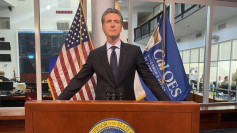Microsoft founder Bill Gates announced Tuesday that he has tested positive for COVID-19. The billionaire philanthropist said he was fortunately only experiencing mild symptoms, crediting the vaccine and the booster shot he recently got for his condition.
Gates said in a post on Twitter that he was isolating himself from his friends and family until he fully recovered. He added that he is thankful to have access to "great medical care." Since the pandemic began, Gates has been a vocal proponent of medical sciences and COVID-19 measures such as vaccinations and booster shots.
He has also pushed global governments to provide more aid and access to vaccinations for poorer countries. Gates said in October that his foundation, Bill and Melinda Gates Foundation, will contribute US$120 million to expand lower-income nations' access to generic versions of Merck's antiviral Covid-19 treatment.
Despite his efforts to push the science, Gates had been caught up in some wild conspiracy theories about the virus. In one conspiracy theory, it was claimed that Gates was involved in the creation and release of the virus with the goal of controlling the people and profiting from the disease. Another wild theory claimed that Gates was pushing for the vaccines to insert nanochips into people so he could track anyone around the world. Gates remarked early last year that the level of "crazy" and "evil" conspiracy theories about him emerging on social media had surprised him.
Gates said he is already concerned about the next global epidemic as omicron subvariants continue to drive up case counts in some countries. In his new book, "How to Prevent the Next Pandemic," Gates, who famously prophesied that the world was unprepared for a pandemic in a 2015 TED Talk, provides his thoughts on how to better combat a worldwide epidemic the next time around.
In the book, Gates draws inspiration from firefighters, proposing that a worldwide specialized team committed to understanding and avoiding pandemics, comprised of thousands of individuals, should immediately be established. Gates said such a team would be able to respond quickly to outbreaks and limit infections if another pandemic occurs.
Gates said international groups such as the World Health Organization would not be enough to prevent another pandemic. He argued that these organizations aren't sufficiently funded to travel to countries where there are outbreaks and to conduct studies necessary to come up with vaccines. Gates said if there was ever a right time to invest more money into becoming prepared, it would be right now.





